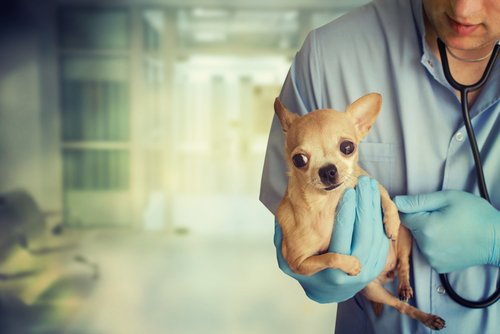5 Ways to Care for Small Dog Breeds

When we decide that a pet will be part of our lives, we know that we must take charge of their care and welfare in different aspects. But, as you may have noticed, not all animals require the same attention. Today, we will tell you about the specific needs of small breed dogs.
1-Taking greater care with small breed dogs when facing extreme temperatures

It is well known that dog’s fur acts as a thermal regulator both in cases of cold and heat. But if their fur is not thick, small breed dogs run the risk of losing temperature quickly precisely due to their small size and that their layer of fat is also usually lower.
Keep in mind that hypothermia is common in animals weighing less than two kilos.
For these reasons, it is essential that you keep your dog warm with appropriate clothes, especially when you go out on the street. But you should not just protect him from low temperatures. Take into account that factors such as wind, rain and humidity can make him feel even colder than the thermometer shows.
Not all animals require the same care. Today, we will tell you about the specific needs of small breed dogs.
2-Food
The metabolism of a small dog works at a higher rate. This happens partly because, as we already mentioned, he must make a greater effort to maintain his body temperature. That is why he needs to eat more frequently and consume a higher number of calories.
In the pet products market, there are elaborate foods specifically for small-breed dogs that, in addition to considering their nutritional needs, take into account the size of their mouths. The smaller kibble, then, facilitates their ingestion and takes care of their oral health.
Consult your veterinarian about the best options for balancing your dog’s diet. And if you decide to give him home-cooked food, make sure that, without any doubt, you’re providing a proper diet.
3-Teeth
Some breeds of small dogs can suffer major deterioration in their teeth, which usually begins to appear after 3 years of age. Among the signs that should call your attention to this issue, the following stand out:
- Bad breath.
- Bleeding gums.
- Refusal of examination of his mouth, because of the pain or discomfort he is feeling.
Regularly brushing his teeth, then, is a fundamental tool for taking care of the health of your dog’s mouth. Once again, go to a professional who can explain how you should do it and what products to use in order to carry out this task correctly. But in addition to brushing his teeth, you must add in periodic check-ups and cleanings by the veterinarian.
In addition, giving him the right food for his size and even dental bars as a treat will help keep his teeth clean and remove tartar. Moreover, some toys, because of their specific design, help to remove plaque.
4-Nails
While nail cutting is part of the usual care of all dogs, it is a subject to which you should pay more attention. Small breed dogs need their claws to be cut more frequently, since they are less likely to get worn down naturally than in their larger counterparts.
The main reason is that they spend a lot of time inside the house, where there are not too many opportunities for their nails to be worn down, as if there would be if they exercised more regularly out in the open. In addition, its small weight does not help to get rid of them either.
In order to make sure that the length of your dog’s nails does not make movement difficult for him, you will have to cut them often. If you have doubts about how to do it correctly or are afraid of hurting him, ask the veterinarian to help you with this matter.
5-Heart

The heart valves can cause problems for about 60 percent of small dogs, causing this organ to weaken and not to pump enough blood.
These issues begin to appear more often after the animals reach 10 years of age.
Being aware of signs like excessive panting and having regular check-ups can help to prevent these heart diseases in your pet.
When we decide that a pet will be part of our lives, we know that we must take charge of their care and welfare in different aspects. But, as you may have noticed, not all animals require the same attention. Today, we will tell you about the specific needs of small breed dogs.
1-Taking greater care with small breed dogs when facing extreme temperatures

It is well known that dog’s fur acts as a thermal regulator both in cases of cold and heat. But if their fur is not thick, small breed dogs run the risk of losing temperature quickly precisely due to their small size and that their layer of fat is also usually lower.
Keep in mind that hypothermia is common in animals weighing less than two kilos.
For these reasons, it is essential that you keep your dog warm with appropriate clothes, especially when you go out on the street. But you should not just protect him from low temperatures. Take into account that factors such as wind, rain and humidity can make him feel even colder than the thermometer shows.
Not all animals require the same care. Today, we will tell you about the specific needs of small breed dogs.
2-Food
The metabolism of a small dog works at a higher rate. This happens partly because, as we already mentioned, he must make a greater effort to maintain his body temperature. That is why he needs to eat more frequently and consume a higher number of calories.
In the pet products market, there are elaborate foods specifically for small-breed dogs that, in addition to considering their nutritional needs, take into account the size of their mouths. The smaller kibble, then, facilitates their ingestion and takes care of their oral health.
Consult your veterinarian about the best options for balancing your dog’s diet. And if you decide to give him home-cooked food, make sure that, without any doubt, you’re providing a proper diet.
3-Teeth
Some breeds of small dogs can suffer major deterioration in their teeth, which usually begins to appear after 3 years of age. Among the signs that should call your attention to this issue, the following stand out:
- Bad breath.
- Bleeding gums.
- Refusal of examination of his mouth, because of the pain or discomfort he is feeling.
Regularly brushing his teeth, then, is a fundamental tool for taking care of the health of your dog’s mouth. Once again, go to a professional who can explain how you should do it and what products to use in order to carry out this task correctly. But in addition to brushing his teeth, you must add in periodic check-ups and cleanings by the veterinarian.
In addition, giving him the right food for his size and even dental bars as a treat will help keep his teeth clean and remove tartar. Moreover, some toys, because of their specific design, help to remove plaque.
4-Nails
While nail cutting is part of the usual care of all dogs, it is a subject to which you should pay more attention. Small breed dogs need their claws to be cut more frequently, since they are less likely to get worn down naturally than in their larger counterparts.
The main reason is that they spend a lot of time inside the house, where there are not too many opportunities for their nails to be worn down, as if there would be if they exercised more regularly out in the open. In addition, its small weight does not help to get rid of them either.
In order to make sure that the length of your dog’s nails does not make movement difficult for him, you will have to cut them often. If you have doubts about how to do it correctly or are afraid of hurting him, ask the veterinarian to help you with this matter.
5-Heart

The heart valves can cause problems for about 60 percent of small dogs, causing this organ to weaken and not to pump enough blood.
These issues begin to appear more often after the animals reach 10 years of age.
Being aware of signs like excessive panting and having regular check-ups can help to prevent these heart diseases in your pet.
This text is provided for informational purposes only and does not replace consultation with a professional. If in doubt, consult your specialist.








